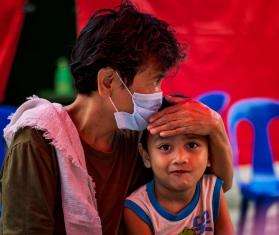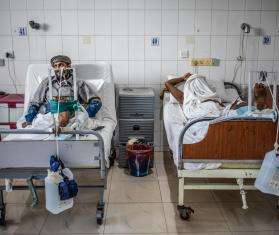Maartje Hoetjes, a Doctors Without Borders/Médecins Sans Frontières (MSF) nurse and emergency team member, shares some experiences from her time at Leer hospital in South Sudan.
Two people with gunshot wounds are brought to the MSF hospital in Leer. They were at a wedding celebration the previous evening when someone entered and started shooting. Five people were seriously injured. Two of them managed to reach our hospital but the other three died on the way.
During my support visit to the hospital, I see one of the victims, a 12-year-old boy in the intensive care unit. The nurse tells me that he was shot in the buttock and the bullet exited though his stomach. The doctor cleaned the wound as much as possible and bandaged it. We hope the bullet has touched nothing essential, but there’s lots of bleeding and two laboratory technicians are trying hard to find a blood donor.
On the other side of the intensive care unit is a young man on a mattress, his head bandaged. The bullet entered through the back of his head and exited just above his right eye. He is unconscious. It’s remarkable that he has survived so long.
I visit the other departments of the hospital, take a look around, and talk to my colleagues in our therapeutic feeding center and clinic. While walking towards the maternity ward, I hear heart wrenching screaming and wailing. The sadness in those cries echoes around the compound. I see a grief-stricken mother, her face etched in pain and covered with tears. She’s being supported by family members as they walk out the gate. My worst fears are confirmed when I see a man and a woman carrying a lifeless body wrapped in fabric. Its small size tells me that it’s the 12-year-old boy. I stand still for a few moments. So young, so pointless.
I decide to go back to the intensive care unit to support my colleagues. Everyone’s back at work again, but I see the mother of the man with the head injury at sitting at his bedside. Her legs are drawn up to her chest and her arms are wrapped tightly around them. Her body trembles and shakes, her shoulders moving up and down as she sobs. I’m not sure what to do—should I leave her alone or should I stay with her? She looks down and seems to have shut herself off from her surroundings. I’m a stranger, maybe she wants to be alone? But I want her to know that she isn’t alone, I can’t see this sorrow and just pass her by.
I sit down next to her and rub her back to get her to calm down. Her breathing is rapid and I'm afraid she’s starting to hyperventilate. I talk calmly to her and then start breathing exercises, exhaling out loud and hoping that she’ll join me and her breathing will slow down. The minutes seem like hours but eventually her breathing stabilizes. She climbs on to the middle of the mattress and she grabs hold of her son’s hand. She doesn’t look at me but it doesn’t matter. She’s able to function again as a mother to the son she loves so much. She’s able to help him fight for survival.
Two days later I visit the intensive care unit again. The young man sits upright while his mother helps him to drink a cup of milk. He drinks well and the nurse tells me that he has started talking. Miracles can happen, even here.
MSF has been working in Leer for the past 25 years, providing both in- and outpatient care for children and adults, surgery, maternity, HIV/TB treatment, and intensive care. In late January/early February this year, MSF's hospital in Leer, southern Unity state, was destroyed along with most of town. It was the only facility providing secondary healthcare, including surgery and treatment for HIV and tuberculosis, in an area with approximately 270,000 people. Entire buildings were reduced to ash, and equipment needed for surgery, the storage of vaccines, blood transfusions, and laboratory work were destroyed. In May, MSF resumed some activities as people started to return to Leer.





